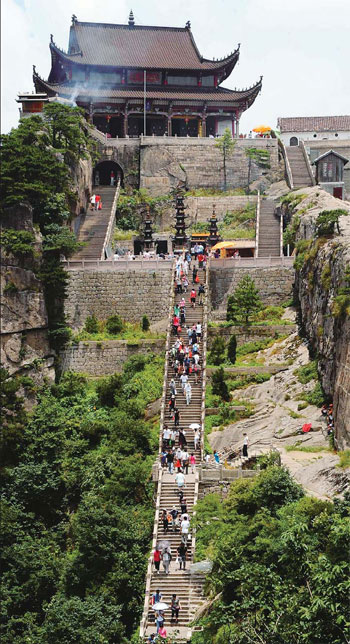|

Jiuhua Mountain is a perfect retreat for both temple and nature lovers. Asia News Photo |
Whether it's for a religious experience or the spectacular views, Jiuhua Mountain is tops, Xiao Cui reports.
Astride the Yangtze River and close to Anhui province's esteemed Yellow Mountain stands the famous Buddhist mountain of Jiuhua. With its cool breezes, flavorful food and religious solemnity, a two-day holiday to this mountain is a perfect retreat for temple and nature lovers.
Jiuhua Mountain stands in Qingyang county in southern Anhui province, 643 kilometers from Shanghai. As one of China's four sacred Buddhist mountains, Jiuhua is also known as "Lotus Flower Buddhist Kingdom" because its nine peaks are similar to the shape of lotus flowers.
It has been the home of Buddhist shrines and temples since the 7th century. There are about 90 temples on the mountain from different historical periods.
Of the 18 scenic spots on the mountain, one of the most tourist-friendly is Jiuhua Street. With hundreds of years of Buddhist influence, temples sit side-by-side shops, schools, homes and restaurants, dispelling the myth that Buddhist monks live in seclusion. This area, while thronging with tourists, is just one part of the tapestry that weaves this mountain community together.
There are many temples along Jiuhua Street, so be sure to buy or bring incense to add a special element to your temple trek. Visitors strolling along the street shouldn't miss the mountain's oldest, holiest temple, Huacheng. While the structure may seem unassuming and uninspiring upon first glance, visitors who take a closer look will see the temple's more artistic and intricate structure and decoration.
Another one of the mountain's historic temples is Baisui, where visitors can see the gold-covered body of the famous monk Wu Xia.
This temple houses one of the biggest mysteries on Jiuhua Mountain. It is said that Wu Xia died at the age of 126 and, after his death, his body was kept in a cave.
Three years later, monks removed the body to find it still preserved. Now, the body is covered with gold power and displayed in the temple, but it may prove a little frightening for some visitors.
But as monks chant scripture and visitors see the piety on believers' faces, one's impressions of the mummy-like monk will surely shift and change, like the incense smoke swirling around it.
Even though the temple may be crowded, the peacefulness and tranquility found inside will make visitors feel as if they're in a secluded sanctuary.
Continuing the temple trek along Jiuhua Street, Zhiyuan Temple and Roushen Temple are also worth a visit. After a stroll through these temples one will find the smell of incense dissipating and replaced by the commerce of small souvenir shops selling such items as Yunwu tea, handmade bamboo works, wooden knockers and Buddhist prayer beads.
There are many vegetarian restaurants along Jiuhua Street, but the vegetarian meals available in the temples are a more attractive and authentic dining option. The dishes are simple and cooked with bamboo shoots and black mushrooms. The rice is steamed with mountain spring water, giving it a distinctive flavor.

After a day of strolling through the mountain's peaceful temples, visitors should make use of the second day on Jiuhua Mountain to see Tiantai Peak. The peak is known to have some of the best sunrise views in China. So be sure to set the alarm early to make the cable car to the peak before sunrise. Visitors will still need to walk a distance to the top of the peak after getting out of the cable car. But the hike is worth the breathtaking views found at the top.
Sitting on the mountain's peak, visitors wait for the sun to rise, while a golden light shines through the clouds. In the distance, there is chiming of bells from temples far away.
With the cool wafting breeze and the pleasant fragrances of flowers and trees, the chirping of birds, and the views of temples and pagodas in the distance, tourists may feel they've reached heaven as they watch the sun rising above the mountain.
Whether travelers are looking to indulge in their spiritual side or appreciate the views of a breathtaking mountaintop sunrise, they will appreciate a weekend on Anhui's Jiuhua Mountain.
(China Daily 08/13/2010)

